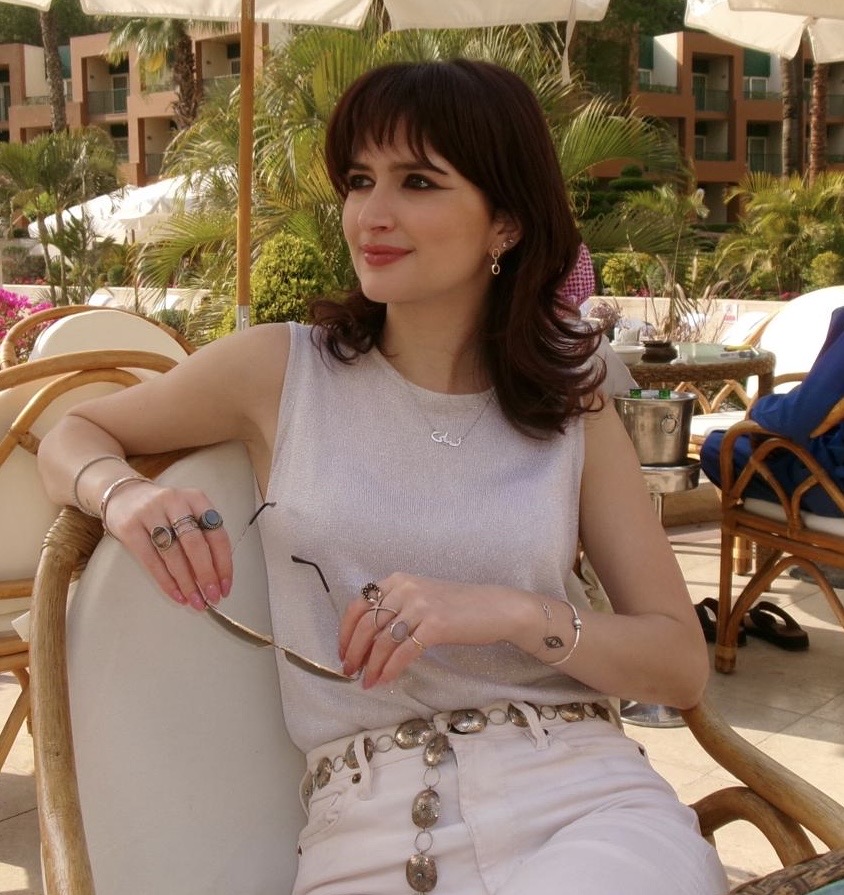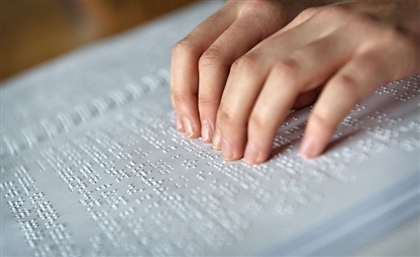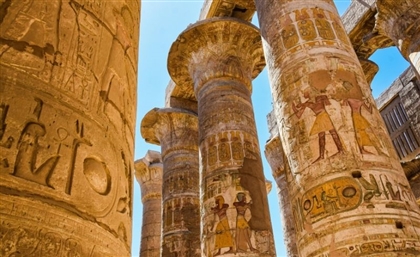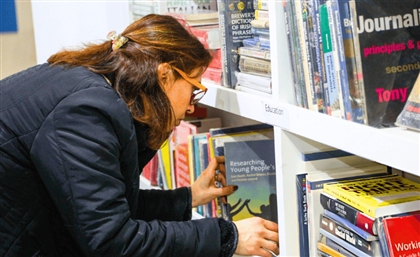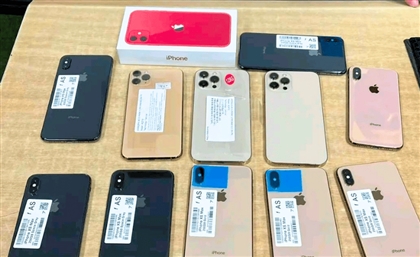Advice From My Bawab, The Most Reliable Man In My Life
Since I moved to Cairo a month ago, Abu Saleh has been the most reliable constant in my life. He wants me to know I am safe here, but at a cost.
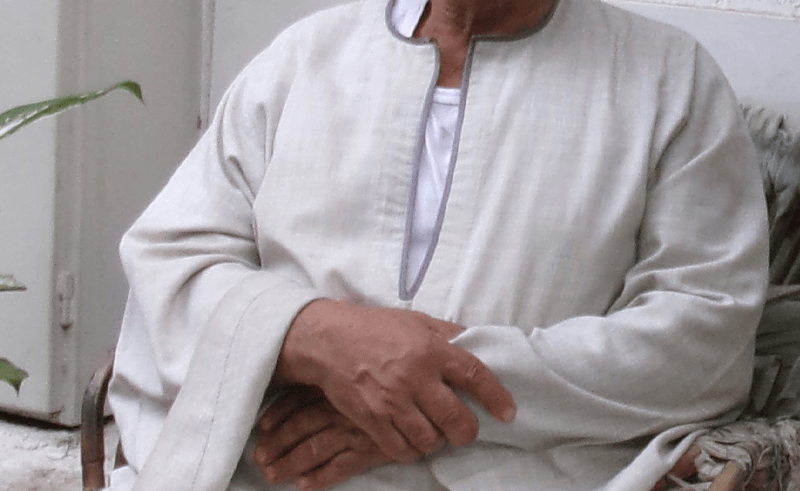
I didn’t realize how much I loved my bawab until he went on vacation.
Saleh Muhammad left his chair vacant like a memorial. I had never seen the cardboard boxes covering its seat cushions. Seven years of sitting modeled them into a perfect cast of his backside.
I don’t think anyone, even my mother, has cared as much about my comings and goings as Abu Saleh, the moniker I prefer. He still, though, seems surprised every time I come home, perhaps sensing my ebbing, flowing, and ultimately subsiding ambivalence toward Cairo.
“Laila!” He raises a hand from his chair when I approach. “How are you? Good? Praise be to God!”
He smiles, revealing a missing tooth. A knit kufi cap sits atop his head. With his other hand, he fingers a string of prayer beads. Abu Saleh opts for galabiyas in lighter colors—whites, grays and blues—that he pairs with the same once-black sandals. I hear them shuffle up the stairs when he goes to water the plants on the sixth floor balcony. He is very concerned with their water intake, as well as the water intake of the plants on my friend Gregory’s adjacent balcony. -73dfadd2-0380-49ca-81a5-a102bfccd6f5.png) Abu Saleh has been the most reliable constant in my life since I moved here a month ago. For the past two-ish years since graduating from university in Pennsylvania, I taught English and then studied Arabic in Jordan. Before that, bar brief spats in Palestine and Lebanon (the country of my origin), I spent my entire life in the U.S. I never pictured myself living outside of the Levant in the Arab world, but the chance to work full-time as a journalist in the most colorful, happening city on earth was an opportunity I could not refuse.
I chose to live in Zamalek, a man-made island on the Nile known for its embassies and expats, where my foreigner privilege grants me ease in living alone as a 24-year-old woman. My parents actually lived in the same building I live in now 30 years ago, a story I will tell another time.
These quainter, foreigner-frequented neighborhoods of downtown Cairo would agree on Abu Saleh’s permanence. He has been a bawab in the area for 40 years. Before moving to this apartment in Zamalek, he worked at a building in Dokki. He is also the proud father of five grown children whose photographs he carries in his wallet. Two days after moving into the building I kept my Uber waiting for 10 minutes because I didn’t want to interrupt him. It was important that I heard the details of each child’s CV, career trajectory and marriage status. Absolutely more important than my trip to Ikea.
Abu Saleh wanted me to know that he spends 25 days out of the month at this apartment building, taking only five “to see the madam” in Fayoum, whose name is also Laila.
Occasionally, after the pleasantries, Abu Saleh will throw in another question to make sure I know he’s doing his job.
“Why did the Talabat driver come when you weren’t here?” he asked me last week. I had ordered dinner while I was still on my way home. “Is there someone else staying with you?”
“If there is, you have to tell us.” The ‘us’ in question—him and the landlord, who told him that the entire building is his home, he said.
Sometimes, when I come back late, I’ll catch him sleeping in his chair, slightly hidden behind a tall potted plant. I will try to sneak past him through the door and up the stairs.
“MEEN?” A voice bellows behind me as I reach the second stair. “WHO?”
“It’s me,” I squeak, as if I am coming home past curfew. “Laila”
Before my arrival to Cairo, I heard the stories of bawabs knowing all the tea. It is inevitable when you are posted outside of a building 24/7 to get curious, especially when you are the guard of a building full of foreigners who are leading all sorts of guests and mixed-gender groups upstairs.
“I know everything that is happening in this building,” Abu Saleh reassured me the other day. I did not, however, feel reassured. He pointed to his eyes, his fingernails dangerously close to his corneas. “I see everything.”
I quietly ran through everything I could have done to upset Abu Saleh in the past few weeks. The only thing I could think of was when, after a friend’s goodbye party, I offered to host.
“Remember when you brought 10 people here the other day?” He confirmed.
I remember walking towards the door with the group in tow late on a Friday night. Abu Saleh stood in front of the metal gate, between us and the after party. After some negotiation with the Egyptian men of the group, he let us pass under one condition: don’t stay too late.
“Yes, I remember,” I said.
“You just need to know,” he leaned forward, “that if something happens, it's on you.”
“Come with me,” he beckoned me to his room off the lobby. He ducked inside and returned with a copy of the lease that I had actually never signed. He pointed to the Arabic writing that I couldn’t read quickly enough at a glance.
“Look,” he said, “you are responsible for what happens.”
“I’m so sorry if that was a problem,” I said, playing the naive foreigner card.
“No problem! No problem!” he said. “Listen, if you have a few people over, for something to eat, something to drink, for just a couple of hours, no problem. But if you have big, noisy parties that is a problem. And if you have people coming with suitcases, staying for longer, you need to tell us.”
“Abu Saleh,” I began, “as a foreigner new to Cairo, what advice would you give me?”
He began with a one liner: “What is right is right; what is wrong is wrong.”
Then he sat back down on his bamboo throne, fingers pursed. “Lazim timshi shway shway,” he said, his hand bouncing to the cadence of his benevolent guidance. “Move slowly, move carefully, move calmly.”
It is a sentence whose English translation does not do it justice, as is so often the case with Arabic. It does not capture the oddly precise ambiguity of ‘shway shway’. It meant that whatever happens in my apartment is my business, but whatever he can see at the door or on the stairs is his business as much as it is mine. Abu Saleh, the all-knowing bawab would keep me safe as long as I didn’t cause a ruckus or hide any secrets. To be on his good side, to get the ‘Good mornings’ and ‘How are yous?’ that had tenderly consecrated my days, I would have to resign to Abu Saleh’s surveillance. And I was happy to.
“Have foreigners ever caused problems here? Never!” he shook his head with certainty. “We can relax around foreigners. All they do is go to work and come back home and sleep. That’s it.”
“I love them and they love me.” Abu Saleh leaned back with a grin. “I am the best bawab.”
“Yes, Abu Saleh.” I nodded. “You are right.”
“But you, you are like my daughter.” He placed his hand over his heart. “So, I will take care of you like my daughter.”
Abu Saleh has been the most reliable constant in my life since I moved here a month ago. For the past two-ish years since graduating from university in Pennsylvania, I taught English and then studied Arabic in Jordan. Before that, bar brief spats in Palestine and Lebanon (the country of my origin), I spent my entire life in the U.S. I never pictured myself living outside of the Levant in the Arab world, but the chance to work full-time as a journalist in the most colorful, happening city on earth was an opportunity I could not refuse.
I chose to live in Zamalek, a man-made island on the Nile known for its embassies and expats, where my foreigner privilege grants me ease in living alone as a 24-year-old woman. My parents actually lived in the same building I live in now 30 years ago, a story I will tell another time.
These quainter, foreigner-frequented neighborhoods of downtown Cairo would agree on Abu Saleh’s permanence. He has been a bawab in the area for 40 years. Before moving to this apartment in Zamalek, he worked at a building in Dokki. He is also the proud father of five grown children whose photographs he carries in his wallet. Two days after moving into the building I kept my Uber waiting for 10 minutes because I didn’t want to interrupt him. It was important that I heard the details of each child’s CV, career trajectory and marriage status. Absolutely more important than my trip to Ikea.
Abu Saleh wanted me to know that he spends 25 days out of the month at this apartment building, taking only five “to see the madam” in Fayoum, whose name is also Laila.
Occasionally, after the pleasantries, Abu Saleh will throw in another question to make sure I know he’s doing his job.
“Why did the Talabat driver come when you weren’t here?” he asked me last week. I had ordered dinner while I was still on my way home. “Is there someone else staying with you?”
“If there is, you have to tell us.” The ‘us’ in question—him and the landlord, who told him that the entire building is his home, he said.
Sometimes, when I come back late, I’ll catch him sleeping in his chair, slightly hidden behind a tall potted plant. I will try to sneak past him through the door and up the stairs.
“MEEN?” A voice bellows behind me as I reach the second stair. “WHO?”
“It’s me,” I squeak, as if I am coming home past curfew. “Laila”
Before my arrival to Cairo, I heard the stories of bawabs knowing all the tea. It is inevitable when you are posted outside of a building 24/7 to get curious, especially when you are the guard of a building full of foreigners who are leading all sorts of guests and mixed-gender groups upstairs.
“I know everything that is happening in this building,” Abu Saleh reassured me the other day. I did not, however, feel reassured. He pointed to his eyes, his fingernails dangerously close to his corneas. “I see everything.”
I quietly ran through everything I could have done to upset Abu Saleh in the past few weeks. The only thing I could think of was when, after a friend’s goodbye party, I offered to host.
“Remember when you brought 10 people here the other day?” He confirmed.
I remember walking towards the door with the group in tow late on a Friday night. Abu Saleh stood in front of the metal gate, between us and the after party. After some negotiation with the Egyptian men of the group, he let us pass under one condition: don’t stay too late.
“Yes, I remember,” I said.
“You just need to know,” he leaned forward, “that if something happens, it's on you.”
“Come with me,” he beckoned me to his room off the lobby. He ducked inside and returned with a copy of the lease that I had actually never signed. He pointed to the Arabic writing that I couldn’t read quickly enough at a glance.
“Look,” he said, “you are responsible for what happens.”
“I’m so sorry if that was a problem,” I said, playing the naive foreigner card.
“No problem! No problem!” he said. “Listen, if you have a few people over, for something to eat, something to drink, for just a couple of hours, no problem. But if you have big, noisy parties that is a problem. And if you have people coming with suitcases, staying for longer, you need to tell us.”
“Abu Saleh,” I began, “as a foreigner new to Cairo, what advice would you give me?”
He began with a one liner: “What is right is right; what is wrong is wrong.”
Then he sat back down on his bamboo throne, fingers pursed. “Lazim timshi shway shway,” he said, his hand bouncing to the cadence of his benevolent guidance. “Move slowly, move carefully, move calmly.”
It is a sentence whose English translation does not do it justice, as is so often the case with Arabic. It does not capture the oddly precise ambiguity of ‘shway shway’. It meant that whatever happens in my apartment is my business, but whatever he can see at the door or on the stairs is his business as much as it is mine. Abu Saleh, the all-knowing bawab would keep me safe as long as I didn’t cause a ruckus or hide any secrets. To be on his good side, to get the ‘Good mornings’ and ‘How are yous?’ that had tenderly consecrated my days, I would have to resign to Abu Saleh’s surveillance. And I was happy to.
“Have foreigners ever caused problems here? Never!” he shook his head with certainty. “We can relax around foreigners. All they do is go to work and come back home and sleep. That’s it.”
“I love them and they love me.” Abu Saleh leaned back with a grin. “I am the best bawab.”
“Yes, Abu Saleh.” I nodded. “You are right.”
“But you, you are like my daughter.” He placed his hand over his heart. “So, I will take care of you like my daughter.”
- Previous Article UAE Opens 7.5 KM Pipeline to Get Desalinated Water From Egypt to Gaza
- Next Article Egypt to Air TV Content in 23 Languages
Trending This Week
-
Jan 18, 2026
-
Jan 18, 2026







